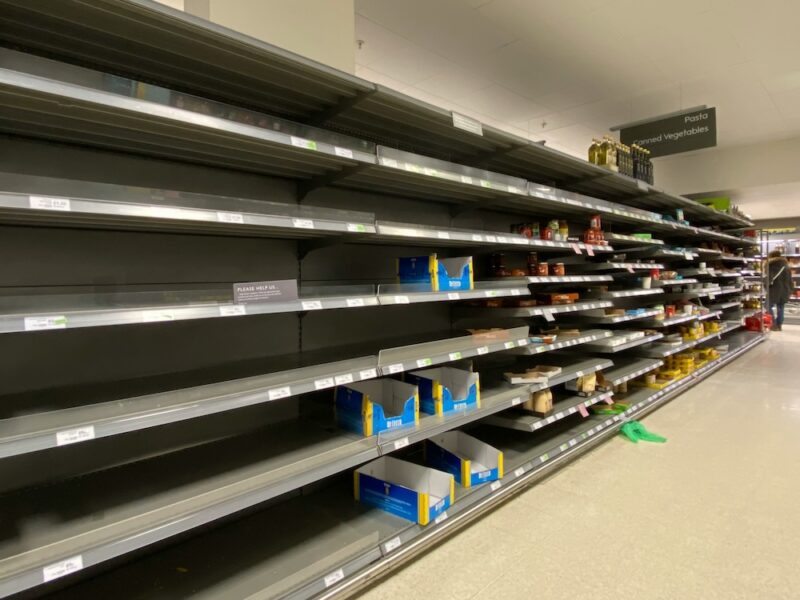Our Food 1200’s Duncan Fisher reflects on a new report looking at the resilience of our food system.
A major report on food security arrived last week, launched by the National Preparedness Commission: Just in Case: narrowing the UK civil food resilience gap. At 380 pages with nearly 900 references, it is a comprehensive analysis by the UK’s most eminent food policy expert, Professor Tim Lang. The report features Wales, not because Tim Lang is himself of part Welsh heritage, but because some impressive things are happening here in relation to growing food.
The news, however, is very bad. We take our food for granted – supermarkets are fully stocked all the time (well, almost – panic will clear the shelves in a few hours). But the risks we face are enormous and growing. The effects of climate overheating are already impacting food production, and will drive prices up enormously over time. Wars are blocking trade routes, forcing up prices too, as we have seen in Ukraine and the Middle East. Our incredibly centralised food system (95% of our shop-bought food comes through ten supermarkets, p.84) is inherently vulnerable to cyber-attack, bringing our whole food system to a halt. Then there are financial crises, fuel supply crises, biodiversity loss… And we can’t expect these impacts to appear neatly at different times. “When sorrows come, they come not single spies, but in battalions.”
We take our food for granted – supermarkets are fully stocked all the time (well, almost – panic will clear the shelves in a few hours). But the risks we face are enormous and growing.
We are badly prepared to respond. The UK’s risk management system largely ignores the public when analysing food supply issues, which is why the National Preparedness Commission commissioned Tim Lang’s report. We are hugely over-dependent on fruit and vegetable imports (78% imported, p.48), particularly from Europe, with which we have introduced a wide range of new trade barriers. Local governments are penniless and getting poorer, unable to focus on improving long-term wellbeing.
We lack the skills needed for growing the kinds of food we now need, particularly vegetables and fruit. There is no storage in our highly efficient ‘just in time’ food system, hence the sudden emptying of shelves in periods of crisis. Extreme weather events are dramatically affecting our harvests. And, above all, our society is hugely unequal. Already people are going hungry. The number of people facing food insecurity will rise inexorably.
Lang calls for a shift in focus in the food debate. We cannot “leave it to Tesco et al.” We cannot continue to focus on niche food projects that benefit just a handful of people, usually the better off. We have to start planning how to feed people – everybody – during sudden food crises and longer-term, as hunger creeps up on more and more of us. Lang calls for a “whole-society” approach – UK and devolved governments, regional and city governments, communities and households. We cannot protect ourselves individually – even those of us who have the space and wealth to stockpile. Food is a foundation for our entire social system.
Solutions
The good news is that brilliant ways of dealing with the growing crisis abound all over the world. Lang presents dozens of examples of action, at national, regional and local level, including in Wales. He praises Welsh efforts to develop horticulture for local and regional markets. He draws attention to the thriving community food sector, with sustainable food partnerships operating across the whole country. But these efforts are a mere scattering of good practice and need to be enhanced enormously if they are going to help all three million people in Wales face the future.
If we do take steps to defend our food system, it is good news for farmers, because growing more food, particularly for more local markets, lies at the very heart of the strategy that Lang presents. Our current food system has crushed farmers. We need them to thrive – they are the lynchpin of our society.
Lang presents five big ideas:
- The right to food: the legal requirement of governments to ensure all people are fed.
- Diversifying food supplies: more grown locally and regionally in a decentralised and so more resilient system. More growing on farms and in communities.
- Just-in-case supply systems instead of just-in-time: more storage read for emergencies.
- Whole-of-society approach, from national governments to households. Decentralised effort is more resilient. Engage with the public: honest about potential problems; practical about what can be done.
- Civil food defence: preventive action and, in crises, mobilisation of the UK’s vibrant community, regional and voluntary sectors, particularly to protect the most vulnerable.
Action
City and regional governments play a pivotal role, enabled by national governments. But how can they do this if they are on their knees financially? By leading and building strategic partnerships that pull in skills and money from different sources. That’s how Birmingham is running its vibrant food strategy, working with the London-based Food Foundation. Similarly, the collaboration of cities and regions across Yorkshire, supported by Fix Our Food, run from York University.
Lang’s first recommendation is that every region creates a “Food Resilience Committee” to include officials from relevant public organisations (economy, health, education, environment), civil society organisations, farmers and industry representatives. His report provides detail about how these should function. Every local authority in Wales needs a food strategy that addresses resilience, overseen by these comprehensive partnerships. The Sustainable Food Places partnerships across Wales have already laid the foundation for this – they need full political buy-in from their local authorities and other regional public bodies.
If we do take steps to defend our food system, it is good news for farmers, because growing more food, particularly for more local markets, lies at the very heart of the strategy that Lang presents.
With such leadership, key actions could be agreed across each region, giving the green light to a wide range of players to mobilise action and money. The report suggests the following actions, all of which can be seen starting in parts of Wales:
- Expand commercial growing for local and regional markets. Build new routes to market regionally and in nearby cities. Expand access to land for farming in peri-urban areas. Retain publicly owned farmland for local food growing. Develop planning regulations that support more growing, on existing farms and newly created ones. New farming enterprises need homes in the open countryside (which is why Powys and Bannau Brycheiniog National Park have introduced a new “homes for horticulture” planning policy).
- Expand community growing: allotments, community gardens and farms and orchards, communal fruit harvesting, forest gardening, garden sharing. This enables people on lower incomes access to great food. Implement a “right to grow policy” – the right of community groups to grow on unused public or common land, and their right to buy that land if for sale.
- Provide business support to farmers growing for regional/local markets – new business skills, new growing skills, new financial support. Wales already excels in this kind of support through Farming Connect. We need to attract young people to farming, provide them with land (currently affordable only by the wealthy) and housing and training.
- Expand education. Every child should be taught food preparation and be able to learn to grow it. New careers advice and pathways into farming, particularly horticulture.
- Plan for food shocks. There are four regional resilience forums in Wales, covering Dyfed Powys, Gwent, South Wales and North Wales. They hardly look at food. They must. Publish information for the public about managing in emergencies. Plan for shocks: stockpiling, mass catering, eliminating food waste.
- Support community action. Lang’s report presents a whole community food agenda. Community food action is thriving in Wales and could flourish yet more with food security and resilience as fundamental goals.
Syniadau uchelgeisiol, awdurdodol a mentrus.
Ymunwch â ni i gyfrannu at wneud Cymru gwell.
National government also has a vital role to play, providing a legislative basis for rights, roles and responsibilities. Without that there is no clarity. Lang’s report provides a blueprint for a food strategy for Wales. He recommends a legal “right to food”, a right of citizens to grow food on public land and buy unused land for growing. Food resilience committees should be mandated by law and, as in Scotland, regional food plans also. Local authorities and public land managers should be given powers and duties to use land for food and to buy locally grown food. Lang strongly urges food to be adequately considered in national risk management. Many other legislative changes can help change – planning rules, farming subsidies, training provision, incentivising new regional supply routes, and so on.
The clarion call to ensure everyone is fed can unite food and farming interests across Wales in a way no other food agenda can. It is good news for all – for farmers, for citizens, for food poverty services, for community programmes and for our health service.
Building a new food system that can feed people provides a framework for addressing the other pressing needs in our food system: improving public health through a healthier diet, mitigating climate change and enhancing nature and environment through agroecological growing, creating skilled jobs, revitalising rural communities, reducing food waste and building for the wellbeing of future generations. A Welsh food strategy would address all these.
A united purpose
The clarion call to ensure everyone is fed can unite food and farming interests across Wales in a way no other food agenda can. It is good news for all – for farmers, for citizens, for food poverty services, for community programmes and for our health service.
Tim Lang has much to be thanked for, after a two-year herculean effort to dig out the evidence and tell us all a new story, one that is very sobering, and yet something we can respond to with vigour and skill. As he says, if we don’t get on with building civil food resilience, events ahead will force us.
The report can be found here: Just in Case: narrowing the UK civil food resilience gap
A website has just been launched in Wales to present the actions of the report: www.foodsecurityaction.org.
All articles published on the welsh agenda are subject to IWA’s disclaimer. If you want to support our work tackling Wales’ key challenges, consider becoming a member.





